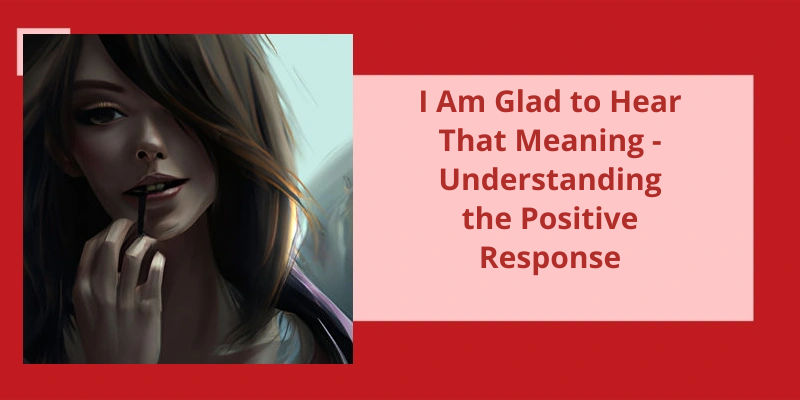As human beings, we’re constantly searching for connections with one another that bring comfort and joy into our lives. A simple phrase such as "glad to hear that" can hold a great deal of power in conveying positivity and cheerfulness. It’s a sentiment that transcends language barriers and can instantly bridge gaps between individuals from different walks of life. Across all cultures and communities, the expression remains a powerful tool to communicate one's delight and appreciation for good news. The sense of warmth and happiness it brings can be felt in the tone of the speaker's voice and the way it lingers in the air. Therefore, it’s no surprise that "glad to hear that" continues to be a widely used phrase even in the modern digital age. As we navigate the constantly-evolving landscape of technology and communication, it’s comforting to know that these small gestures of positivity and optimism still hold their value.
What Does Glad to Hear Mean?
“Glad to hear” is an expression that’s been widely embedded in our everyday conversations. It’s often used in reply to good news. It’s a way of expressing their joy and happiness over the good news that’s been brought to them by someone.
It creates a positive energy in the conversation and shows that the person listening is actively engaged and interested in the exchange. It builds a sense of camaraderie between people and strengthens the connection between them.
It can be used as an acknowledgment to a job well done, a successful event, or just good tidings. It’s a very versatile expression that can be used anytime and anywhere, hence solidifying it’s importance in everyday conversation.
It helps us communicate with our colleagues, friends, and family that we’re attentive and keenly interested in whatever they’re saying. In turn, they feel valued and appreciated and further builds those important bonds.
Lastly, we can’t underestimate the importance of genuine expressions and interactions in our day-to-day lives. It leads to better relationships and positive interactions, which all contribute to a fulfilling life.
Similar Expressions to “Glad to Hear” in Different Languages and Cultures
This article discusses various similar expressions to “glad to hear” in different languages and cultures, highlighting how different communities express their joy and pleasure in response to good news.
It’s important to choose your words carefully when expressing joy or happiness for someone else. While it’s easy to default to phrases like “good to hear,” there’s value in using more personal language. One such example is saying “glad to hear it,” which conveys not just joy but also a personal investment in the other person’s experience.
Is It Correct to Say Glad to Hear It?
When it comes to conveying happiness and enthusiasm towards positive news or feedback, there are different ways to express it in English. One common phrase is “glad to hear it”. The word “glad” carries a personal tone and implies that the speaker is emotionally invested in the good news being shared. It shows that the speaker cares and is pleased to hear that something positive has occurred.
The latter phrase has a more general connotation and doesn’t carry the same emotional weight as “glad to hear it”. It simply means that the news being shared is good for the person who’s hearing it, without necessarily suggesting any personal connection or investment in the matter.
Both phrases are correct English and can be used in various contexts. For instance, they can be used as responses to compliments, congratulations, or any other type of positive feedback. They can also be used to express relief, such as when hearing about someones recovery from an illness or a successful completion of a project.
However, the former is more personal and emotionally invested, while the latter is more general and neutral. Choosing which one to use may depend on the speakers tone, preference, and the context of the situation.
Source: “Good to hear” vs “Glad to hear” – English Stack Exchange
Conclusion
It signifies empathy, support and interest in the lives of others, and it reminds us of the importance of positive communication. Whether you’re sharing good news, expressing your gratitude or simply acknowledging someone's achievements, the words 'glad to hear that' can go a long way in making a difference. So let’s continue to use this phrase with sincerity and enthusiasm, and spread kindness and positivity in our interactions with others.






